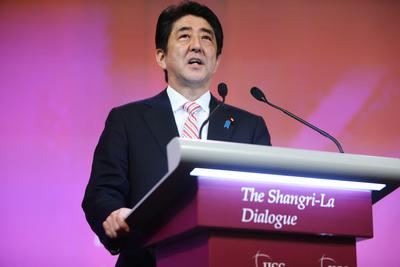It is a well-established pattern for the dialogue’s main message to come from the US secretary of defence. This big media event is normally sandwiched between an opening night keynote address from an Asian leader and China’s criticisms of Washington’s views. The end result has normally been a reminder that US–China strategic relations, including the tensions between the two giants, dominate today’s Asia.
International coverage of this year’s dialogue would suggest that this pattern had continued. US Secretary of Defense Chuck Hagel was widely reported on for his comments that China’s approach to territorial disputes was destabilising for the region. And it was not long before China’s disapproval of these judgements from Washington became clear. But this year the initiative did not rest with either Washington or Beijing. It had been wrested by Tokyo with Prime Minister Shinzo Abe’s especially confident opening night assertion of Japan’s role as a regional security provider in Asia.
Abe’s view did more than ring the now familiar bells about Japan as a more normal military actor with a more confident self-defence force. Abe’s Japan is offering itself as a regional security leader or co-leader for Southeast Asia, where the major powers’ strategic competition is becoming evident. In particular, Abe’s Japan is ready to assist Southeast Asian states with claims to the South China Sea to monitor and fend off an increasingly powerful China.
This gives a wider context to China’s concerns about what went on in Singapore. It was not the usual exchange with the United States. When the PLA’s General Wang addressed the delegates on the last morning, what angered him most was the likelihood that the US and Japan had coordinated their position. Indeed, there was almost the sense that it was the United States that had joined the Japan-led chorus, rather than the other way around. Accustomed to dominating proceedings, both China and the US were being cast into first responder roles.
Hagel’s support for Japan’s emerging role, which led to headlines that China probably dislikes, effectively endorsed Tokyo as co-leader of a regional coalition with Beijing in its sights. For Southeast Asian countries, this poses some real strategic challenges. The Philippines and Vietnam are in such a bind in their territorial disputes with China that they will grasp at almost any sign of help. But it is harder for some of the other states. They are likely to be acutely aware that to back Abe’s vision for Japan will really upset their relations with China. Coincidentally perhaps, but certainly with some prominence, Malaysia’s Prime Minister Najib Razak happened to be in Beijing at the time meeting with Chinese President Xi Jinping, trying to patch things up after the Malaysian Airlines incident.
A Cold War-like chill seems to be affecting great power interactions in Asia. But this is not a reflection of the Sino–US strategic relationship on its own. Instead, the more Japan confidently inserts itself into the discussion as a potential co-leader, the more Tokyo’s enmity with Beijing becomes a part of the wider picture. And the more Japan concludes that the United States is unable to sufficiently reassure its East Asian allies and partners, the more Abe’s government will feel the need to fill the gap.
This makes for some interesting geopolitical moments for Australia. One could easily get the impression from the dialogue that when Canberra talks and acts in Asia it does so almost only in concert with its two trilateral strategic dialogue partners, the US and Japan. Australian Defence Minister Johnston did little to counter those perceptions, and Abe’s depiction of Australia’s role was positively glowing. But the more that Japan is active, the more that Australia can expect to be drawn into the increasingly tense moments between the US and China which are being ‘supercharged’ by the difficulties in Sino–Japanese relations. And the more supercharged that these become, the more the very deep problems in Japan–South Korea relations will be exposed. This presents an enormous alliance challenge for Washington, for which no easy answer seems in sight. South Korea’s silence at the dialogue may have had something to do with the fact that it was Japan’s show.
China’s response is likely to be based around alternating currents. The first is to cry foul and propagate the old containment argument. The problem with this approach is the widespread awareness that if a coalition is being built, China’s own actions in the East and South China Seas are responsible. The second is to insist that, despite the challenges, there is still the prospect of a new era in great power relations. This is Beijing’s comfort zone because it offers the vision of a region where only two powers really matter, itself and Washington. But after this year’s Shangri-La Dialogue, it is clear that the Japan factor, at least while Abe is in charge, simply cannot be ignored.
Robert Ayson is Professor of Strategic Studies at Victoria University of Wellington.

